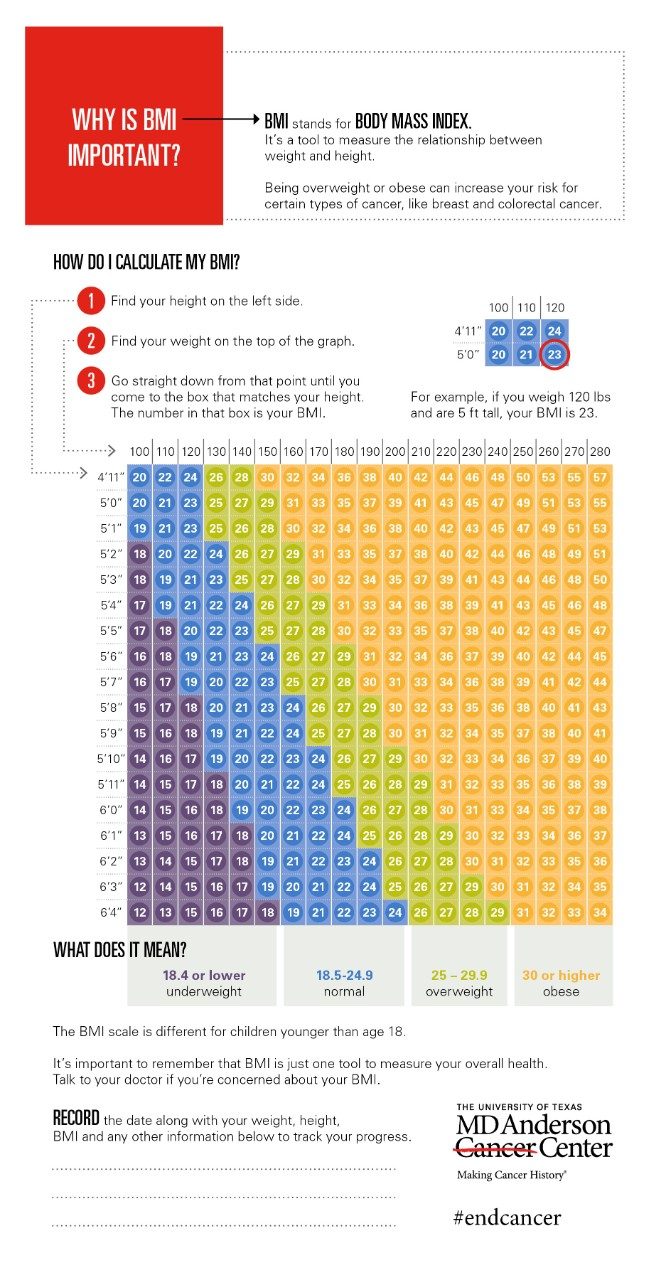BMI: 4 things you should know
BMI is a common method for determining a healthy body weight, but it’s just one indicator when it comes to your health.

BMI, or body mass index, is used to determine a healthy body weight in relation to a specific height.
“When it comes to cancer risk, it’s important to know your BMI,” says Ann-Marie Hedberg, associate director of Clinical Nutrition at MD Anderson. “For some cancers there is a correlation between a high BMI and a increased risk.”
And while BMI is a common indicator, it’s not the only factor that should be considered.
“BMI doesn’t always tell the whole story,” Hedberg says.
Here’s what you should know about BMI.
BMI is a tool
BMI is a scale that can help determine if your weight is healthy in relation to your height. Your BMI is calculated by dividing your weight by the square of you height.
To find your BMI, simply use the chart below. Find your weight in pounds along the bottom and follow the chart to the spot where it meets your height in feet and inches. That number is your BMI.
For women and men, the following BMI ranges indicate your weight status:
- 18 or lower: underweight
- 18.5 to 24.9: normal, healthy weight
- 25 to 29.9: overweight
- 30 or higher: obese
As BMI increases, so does your risk for major health problems
If you have a higher BMI, you’re more likely to have health problems like heart disease, stroke, diabetes, gallbladder disease, sleep apnea and osteoarthritis. Obesity also has been linked to an increased risk of several cancers, including esophageal, pancreatic, colorectal, breast, endometrial and kidney cancer.
BMI doesn’t tell the whole story
“It’s important to remember that BMI is just one factor in determining your overall health,” Hedberg says.
BMI should be considered along with other factors like blood lipid levels and blood pressure to determine if you’re in good health.
A high BMI doesn’t always mean you’re overweight. In fact, those with a very muscular build often have a high BMI, but not a high percentage of body fat.
Talk to your doctor, if you have a high (or low) BMI
Because BMI is just one indicator of your health, it’s best to talk to your doctor if you have a BMI that is considered overweight or underweight.
Meeting with a professional can help you determine if you have underlying health problems. For example, sudden weight gain may be associated with thyroid problems. Sudden changes in weight, in some cases, can be a cancer symptom.
“Don’t just jump into a new diet. There are a lot of factors that go into weight,” Hedberg says. “Not just food.”
A healthy lifestyle includes goals that include a healthy body weight, physical fitness and stress control.
BMI Calculator
Body Mass Index (BMI) is a tool to help you determine if you are a healthy weight. Fill out the fields below to get your BMI.




